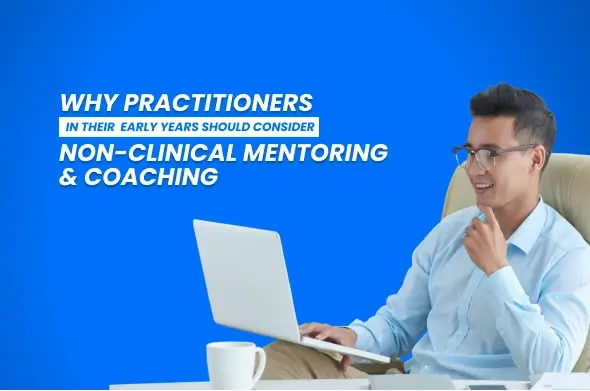
Practice owners are often faced with practitioners in their early years, wanting to focus Soley on clinical upskilling.
In reality, practitioners early in their careers generally do not know what they don't know. In the MAHA program I talk about the 80:20 rule where 80% of time needs to be spent on what I call 'getting your head' right and the 20% on clinical upskilling, marketing etc.
There is plenty of examples of highly skilled practitioners with white space in their appointment’s books.
Practitioners must understand how to manage their patients beyond mere clinical expertise.
Why Practitioners in Their Early Years Should Consider Non-Clinical Mentoring and Coaching.
While it is true the initial years of an Allied Health practitioner’s career are foundational in developing clinical competencies, there is a compelling case to be made for integrating non-clinical mentoring and coaching into this stage of their development. Early-career practitioners who neglect the development of non-clinical skills may find themselves facing challenges in their long-term professional growth, job satisfaction, and overall career progression.
Here’s why early-career practitioners should engage in non-clinical mentoring alongside clinical upskilling:
1. Non-Clinical Skills Enhance Clinical Effectiveness
Clinical expertise is undeniably important, but clinical skills are not exercised in a vacuum. Practitioners must navigate complex interactions with patients, colleagues, and interdisciplinary teams. Non-clinical skills such as communication, team collaboration, and emotional intelligence directly impact the quality of care provided and contribute to better clinical decision-making.
2. Preventing Burnout and Improving Well-Being Early On
Healthcare professionals, especially those in their early careers, are at high risk for burnout. Clinical training can be emotionally and physically draining, leading to stress, anxiety, and ultimately, burnout. Non-clinical mentoring programs that focus on stress management, time management, resilience, and work-life balance can prevent burnout and improve well-being—helping practitioners stay passionate about their work long term.
3. Career Longevity and Advancement
Early-career practitioners who don’t develop non-clinical skills may find themselves plateauing after a few years when it comes to career advancement. Clinical expertise is critical, but leadership, mentorship, and decision-making skills are necessary for future roles such as team leader, manager, or director.
4. Increased Job Satisfaction and Retention
Non-clinical skills like career coaching, self-awareness, and personal growth significantly contribute to a practitioner’s overall job satisfaction. Those who receive non-clinical mentoring early in their careers are often more engaged and feel more supported, which can lead to higher retention rates within the practice or organization. For instance, practitioners with well-developed self-management skills tend to navigate challenges and transitions in their career with greater ease.
5. Non-Clinical Skills are Essential for Effective Interdisciplinary Collaboration
In today’s healthcare environment, interdisciplinary teamwork is vital. Early-career practitioners often need to work closely with doctors, nurses, and other specialists. Non-clinical mentoring can help them develop interpersonal skills, conflict resolution abilities, and team dynamics knowledge—all of which are essential for successful collaboration.
6. Developing Self-Awareness Leads to Better Patient Outcomes
Early-career practitioners often need guidance in developing self-awareness—understanding their own strengths and weaknesses, managing emotions in high-pressure environments, and recognizing how their actions impact others. Non-clinical coaching helps practitioners understand how their emotional state, communication style, and behavior affect patient interactions and clinical decisions.
7. Building a Comprehensive Skill Set for Success in Healthcare
Healthcare is evolving rapidly, and practitioners need to be well-rounded, possessing a balance of both clinical and non-clinical skills. Early investment in non-clinical coaching allows practitioners to develop a more comprehensive skill set that will not only make them more successful in their clinical roles but also better prepared for the changing demands of the healthcare landscape.
Conclusion: Non-Clinical Mentoring Complements Clinical Development
In conclusion, early-career practitioners who engage in non-clinical mentoring and coaching set themselves up for greater success, both in their clinical roles and long-term career trajectories. While clinical upskilling remains a priority, non-clinical skills are what enable practitioners to thrive in their profession, ensuring they can deliver high-quality care, collaborate effectively with teams, manage stress, and ultimately advance in their careers. Investing in non-clinical mentoring early on doesn’t detract from clinical competence; rather, it completes the skill set necessary for a fulfilling, sustainable career in Allied Health.
